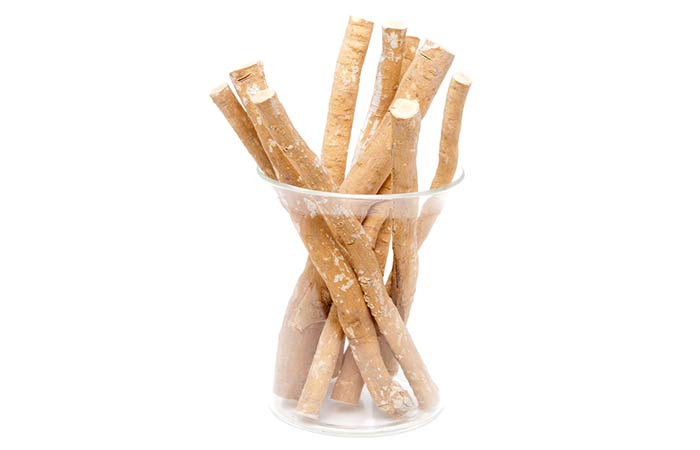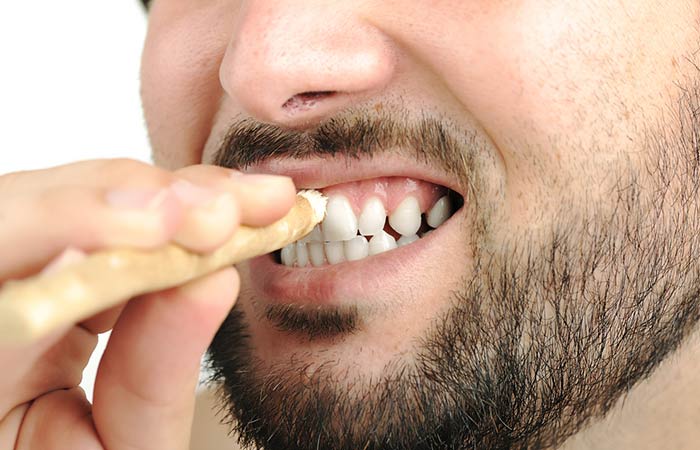7 Amazing Health Benefits Of Miswak
Has the fear of cavities been keeping you off your favorite desserts? Tooth sensitivity making you think twice about having an ice cream on a sultry afternoon? Aching gums reducing you to the dietary habits of a caveman?
Oral hygiene, or the lack of it, is an issue that is seldom thought of seriously. I mean, in a world full of conditions like cancer, heart disease, tuberculosis, etcetera, it comes as no surprise that an aching tooth is the least of most people’s worries. But only one who’s suffered the ache of a bleeding gum or an infected tooth truly knows what a solid ‘pain in the mouth’ it can be. If you count yourself amongst one of the ‘unlucky’ ones or dread this ever happening to you, allow me to introduce you to your favorite new superhero.
History of Miswak—Keeping The Dentist Away Since 5000 BCE
Miswak is a twig that helps in cleaning teeth and has been used for this purpose for over 7000 years now! (Faint recollections of people in rural areas with a ‘stick’ in their mouths early in the mornings? Yes, now you get it).
Combining the functions of a toothbrush and toothpaste, Miswak’s antibacterial properties have saved many a people from cases of dreadful tooth decay and worse across the centuries. Reportedly, Miswak has been in use right since the time of the ancient Babylonians and Egyptians. Which would mean that this humble chew stick is older than Queen Cleopatra? Which in turn means that every time you use Miswak, you’d in fact be brushing with a piece of history!
Scientific Name
Although chew sticks can be made from many commonly occurring plants, such as olive trees, Miswak is most generally associated with the Salvadora persica tree, commonly known as ‘arak’ in Arabic.
Scientific Research
In multiple studies done by the WHO and other independent health organizations, it has been found that people who used Miswak on a regular basis require much lesser dental care than those who used toothpastes and powders. (1)
Research has established that regular use of Miswak has a therapeutic effect on gingival disease, and acts against multiple gum disease causing organisms such as Porphyromonas gingivalis, Aggregatibacter actinomycetemcomitans etcetera. (2)(3)A recent study by Patel PV et al, has found that when used as an adjunct to regular toothbrushes, Miswak helped record a noticeable improvement in plaque score and gingival health. (4)
Apart from this, using Miswak on a regular basis has a host of other benefits too as we shall see shortly.
Importance In Islam
Ever since its origin 7000 years ago, the use of Miswak has never been discontinued. A huge part of the credit for this goes to Islamic jurisprudence that has regularly exhorted its laity regarding good practices associated with using Miswak. The Prophet himself is said to have used ‘twigs made from the Arak tree’, and as such, their use finds mention in the hadiths concerning the Prophet’s life.
Using Miswak on Fridays, before and after going on journeys, before religious practices etcetera, is recommended by hadith, and is faithfully adhered to by millions of inhabitants across the Arabian peninsula, North Africa, Indian subcontinent, Southeast Asia, and their diaspora, till today.
Active Ingredients In Miswak
A raging question by this point would be – what is it about Miswak that makes it all-so-effective? The answer to this question lies in its active ingredients. While most oral disinfectants such as toothpastes, mouthwashes, and tooth powders, build their entire advertising campaigns around just one or two key ingredients such as silica, Miswak has a set of 19 active ingredients that actively promote stronger teeth, while also maintaining oral health.
-
Alkaloids—Salvadorine, Trimethylamine—have an antibacterial effect
-
Silica—natural abrasive, removes stains
-
Calcium, Chlorides, Fluorides—important for dental care. Flouride helps in remineralizing the tooth structure.
-
Sulphur
-
Vitamin C
-
Resins—Form a protective layer over the enamel to prevent the formation of caries
-
Tannins—Function as a natural astringent, stimulate premolar saliva production
-
Saponins, Flavonoids, and Sterols in small amounts
-
Essential oils—impart a mild taste and fragrance, stimulate the production of saliva, and help relieve flatulence
Why It is Called A Truly Safe And Effective Natural Toothbrush
Brushing our teeth twice a day with a streak of shiny white toothpaste (or the zany, red crystals one) is a habit that has been inculcated in most of us right since early childhood. The accepted wisdom behind this practice has been that toothpastes are essential to oral hygiene. Granted. But considering that the first toothpaste was invented sometime in the mid nineteenth century, using chew sticks, or Miswak, is a traditional knowledge that has benefited scores of people over centuries.
With the goodness of a host of naturally occurring active ingredients and zero chemical formulations, Miswak is safe to use and can be used by both adults and children alike. This is in direct contrast to the commercially available toothbrushes and toothpastes that need to be used with extreme caution, especially with younger children, for fear of conditions like fluorosis etcetera. Miswak can also be used comfortably as a natural toothbrush thanks to its effectiveness, to know more about which, we suggest you read our next section!
Benefits Of Miswak
What are the benefits of using ‘Miswak’ over a regular toothbrush? Between a regular toothbrush and Miswak, how does Miswak score over the regular toothbrush, you ask? Without further ado then, here are the top 8 benefits to making Miswak a part of your everyday routine-
1. Fights Tooth Decay And Cavities
One of the greatest blessings of this modern age has been the wide availability of food. Sweet, sour, tangy, bitter, farm fresh, processed—you name it, and your supermarket probably has it. But the increase in the availability of food, especially rich-in-sugar processed food, has manifested itself in the growing incidences of tooth decay in the general population.
Tooth decay occurs when enamel (the glossy white cover on your teeth) is destroyed. But how does it get destroyed despite regular brushing you ask? Simple. Our mouths harbor hundreds of different varieties of bacteria—some good, some bad. These bacteria use starch and sugar present in food to produce acid that wears off the enamel, thereby ushering in the process of decay that eventually leads to a cavity.
While most commercial toothpastes use fluoride as a means to beat this decay, another effective solution to this is right inside you in the form of your saliva. Saliva helps fight tooth decay by preventing the buildup of acid and giving your teeth time to repair themselves. Miswak has been known to increase the formation of saliva in the mouth without the need for any commercial enhancers or additives, thus naturally fighting tooth decay.
Additionally, using Miswak helps strengthen teeth enamel thanks to the sodium chloride, sodium bicarbonate and calcium oxide present in Miswak, thereby promoting tooth whitening too.
2. Protects Against Tartar And Plaque
Did you know that plaque is building up in your mouth as you read this? (No, don’t rush to rinse now, breathe).
Surprisingly enough, the formation of plaque is a common process. Plaque is what they call the colorless film of bacteria that forms on the teeth and gums as the bacteria grow and multiply. But while regular brushing can easily remove plaque, its build-up leads to the formation of ‘tartar’—a visible yellow coloration that sticks to the teeth and gums and may cause gum disease and tooth loss in the future.
The easiest way to prevent the buildup of tartar and plaque, and thereby prevent gum disease and tooth loss, is to brush regularly and in the right manner. Miswak being the ‘toothbrush twig’ helps here thanks to its antibacterial property that prevents the bacteria from accumulating on the teeth and gums.
3. Removes Malodor
Bad breath, medically known as halitosis, is an indicator of a multitude of dental issues. Starting from eating particularly strong foods, to gum disease, and dental cavities, bad breath is a clear warning that things are not how they should be within your mouth. A lack of the production of saliva can lead to malodor too.
Considering how there isn’t one certain cause for bad breath, an all-in-one solution can go a long way in treating this condition. Miswak’s strong antibacterial activity along with its property of enhancing saliva production in the mouth, are an effective remedy for bad breath. Additionally, since it is a naturally occurring substance, using the twig releases certain compounds that create a mild fragrance that is peculiar to Miswak.
4. Fights Harmful Bacteria And Germs
The human mouth harbors no less than 700 different strains of bacteria, not all of which are harmful. While most of the bacteria present in the mouth aid in the breakdown of food, and in many cases even help maintain healthy teeth and gums, some bacteria are bad bacteria that actively destroy the teeth and gums. Dental cavities, tartar, gum disease and periodontitis—a painful condition affecting the gums and jaw bone—are all related to bacteria residing in the mouth.
In numerous studies conducted by the World Health Organization, and other independent research groups, Miswak has been shown to contain a number of active antibacterial compounds that actively fight bacterial growth in the mouth. Also, people using Miswak on a regular basis were seen to suffer from lesser instances of oral hygiene issues than those who didn’t/used regular toothpastes and tooth powders.
4. Protects And Strengthens The Gums
Here’s a pro tip—if you’re worried about whether or not your oral health is in good shape, look at your gums. The gums are the soft tissue that surrounds the teeth and help keep them in good condition. And as such, any condition affecting the teeth is manifested in the gums too.
Plaque build up affects the gums, just as it affects the teeth. The development of plaque into tartar can affect the gums and teeth in three different ways, namely Gingivitis, Periodontitis and Advanced Periodontitis. Most of us might have experienced the sharp pain on having something too cold or hot once in a while. However, if this is a regular occurrence and is accompanied by swelling and inflammation of the gums, the condition is called Gingivitis and needs immediate attention and treatment. Untreated gingivitis with a further buildup of tartar affects the underlying bone structure causes gums to recede, dentures to change, and teeth to be lost eventually—a painful, irreversible condition known as advanced periodontitis.
Scary, right?
Thankfully for us though, Miswak comes to the rescue here too! By helping to prevent the formation of plaque, and the subsequent tartar accumulation, Miswak significantly reduces the chances of gingivitis and periodontitis keeping your gums healthy, and you happy, all through.
5. Anticarcinogenic And Analgesic
Apart from its benefits in oral hygiene and health, Miswak has certain therapeutic effects to recommend its use too. Antioxidant enzymes such as peroxidase, catalase, and polyphenoloxidase present in Miswak are said to have anti-carcinogenic properties, that is, they help prevent cancer. While it is yet to be established how effective Miswak is at fighting cancer that already exists in the body, its use as a preventive measure has been established via research.
Additionally, the active ingredients present in Miswak have analgesic, or pain relieving, properties that help deal with inflammation and pain, especially in the gums.
When was the last time a toothbrush could claim this?
6. Refreshing aftertaste
A key benefit of using Miswak has been its refreshing aftertaste and fragrance. Packed with a whole load of naturally occurring volatile aromatic compounds, using Miswak promotes a feeling of cleanliness and pleasant breath that is comparable to that of any commercially available mouthwash.
7. Affordable and effective
It often stuns many first time users about how affordable and effective Miswak is. Whether you choose to use it in its original ‘toothbrush twig’ form or use formulations made from the Salvadora persica (Miswak) tree, the cost of using Miswak is substantially lower than most commercially available products. Also, considering how Miswak functions as a toothpaste-toothbrush-mouthwash all-in-one, the cost benefits of this can surely not be overlooked.
Additionally, one look at the Miswak twig is enough for anyone to get an idea as to where toothbrush manufacturers get their inspiration from. With a multitude of natural fibers acting as ‘bristles’, the Miswak twig reaches every corner and nook of the mouth for an effective cleanse.
How To Use Miswak?
Miswak can either be used as a standalone, or as an adjunct to your regular toothbrush and toothpaste. To use Miswak effectively, keep these in mind.
-
To start, trim or chew off one end of your Miswak twig.
-
Continue chewing from this end till the twig becomes soft and forms bristles at the center. To enhance this process, you could moisten the twig by dipping it in water.
-
Once you see individual fibers resembling ‘bristles’, brush your teeth using the twig, as you would with a regular toothbrush. Remember to not use any toothpaste though.
-
Trim or chew further up for fresh bristles whenever the existing ones are exhausted.
Medicinal uses of other parts of Miswak (Salvadora persica)
While the Salvadora persica tree is most famous for its ‘toothbrush twigs’, other parts of the tree are just as useful too. Here’s a quick look at them.
-
Leaves—The leaves of Salvadora are consumed in the Middle East and Africa due to their astringent properties that are said to aid in digestion and metabolism. The active ingredients present in Salvadora have analgesic and diuretic properties, enabling its use in traditional treatments for piles, rheumatism, and skin inflammation.
-
Fruits—A sweet alternative to the bitter leaves, the fruits too have diuretic properties, and are used in the treatment of stomach and liver ailments.
-
Bark—Bark derived from the stem and roots is different, and as such has different properties and uses. Stem bark from Salvadora helps create a decoction used in regularizing menstruation in women. Additionally, it also treats epilepsy, stomach ulcers, and skin problems. A paste of the root bark is used for the treatment of gonorrhea.
-
Seeds—Similar to the leaves, the Salvadora seeds too are used in treating rheumatism and skin inflammation. They are also used as purgatives and diuretics.
-
Essential oils—Used as insect and tick repellent.
Shoutout to Priya Nair from Valuefood for this great information!
Other Common names of Miswak
Miswak is commonly referred to as siwak, sewak and miswaak. However, since its usage is spread across different regions, namely North Africa, the Arabian Peninsula, South East Asia and the Indian subcontinent, it goes by different names according to the region, such as.
-
Arak- Arabic
-
Qesam- Hebrew
-
Qisa- Aramaic
-
Mastic- Latin
-
Koyoji- Japanese, etcetera.
As one could see, Miswak definitely has a lot going for it. From protecting your gums, whitening your teeth, preventing tooth decay and cavities, to anti-cancer effects, Miswak is all those things your regular toothbrush can never be—a true savior.
So, let us know in the comments section below what you thought of it, whether you agree or disagree, and if you’ll be making the switch anytime soon!
Now, before you go shopping for miswak, here are answers to a few frequently asked questions about the twig.
Courtesy : stylecraze




